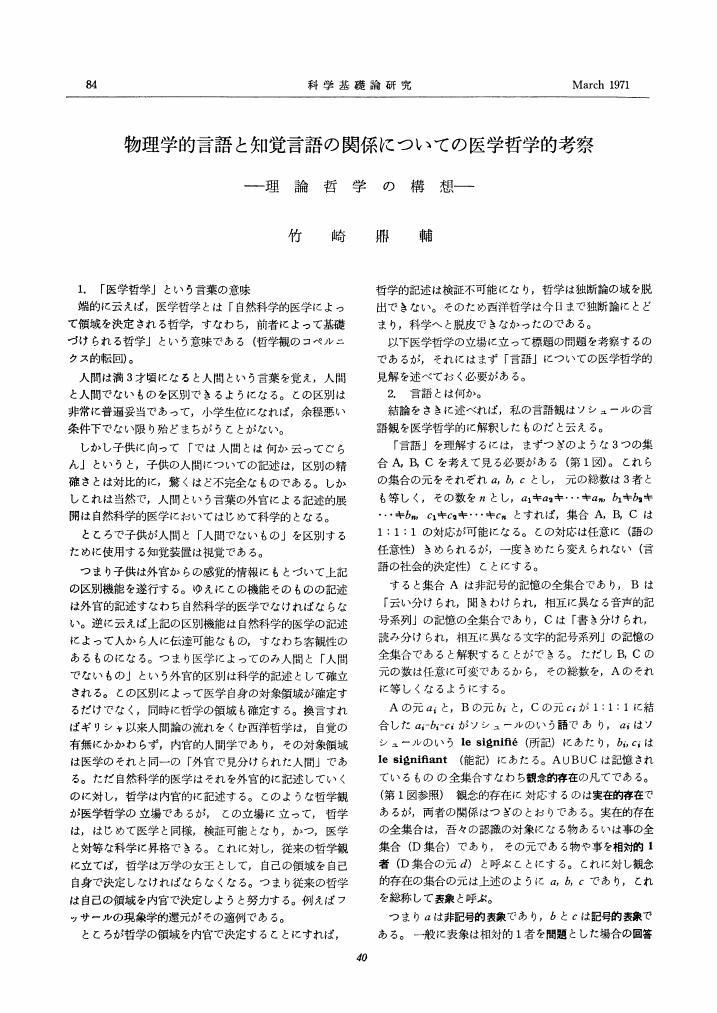1 0 0 0 OA プラトンのイデア数に関する医学哲学的考察
- 著者
- 竹崎 鼎輔
- 出版者
- 科学基礎論学会
- 雑誌
- 科学基礎論研究 (ISSN:00227668)
- 巻号頁・発行日
- vol.10, no.4, pp.182-187, 1972-03-30 (Released:2009-09-04)
- 参考文献数
- 7
1 0 0 0 OA 物理学的言語と知覚言語の関係についての医学哲学的考察 理論哲学の構想
- 著者
- 竹崎 鼎輔
- 出版者
- 科学基礎論学会
- 雑誌
- 科学基礎論研究 (ISSN:00227668)
- 巻号頁・発行日
- vol.10, no.2, pp.84-88, 1971-03-30 (Released:2009-09-04)
1 0 0 0 OA 内官学としての哲学の存在理由
- 著者
- 竹崎 鼎輔
- 出版者
- 日本科学哲学会
- 雑誌
- 科学哲学 (ISSN:02893428)
- 巻号頁・発行日
- vol.5, pp.63-74, 1972-12-25 (Released:2009-05-29)
- 参考文献数
- 9
1 0 0 0 OA 数学の本質に関する人間学的考察
- 著者
- 竹崎 鼎輔
- 出版者
- The Philosophy of Science Society, Japan
- 雑誌
- 科学哲学 (ISSN:02893428)
- 巻号頁・発行日
- vol.1, pp.147-161, 1968-10-10 (Released:2009-05-29)
Every science must be based on anthropology, not on philosophy. This is because every science is created by man; and philosophy forms part of anthropology-an anthropology of the inner sense.To explain the essence of mathematics from the viewpoint of anthropology, especially of anthropology of the inner sense, I have classified knowledge in general into five categories to define what kind of knowledge mathematics is: (1) natural knowledge and artificial knowledge; (2) knowledge of the outer sense and knowledge of the inner sense ; (3) knowledge as reality and knowledge as memory; (4) knowledge as image and knowledge as language; (5) inductive knowledge and deductive knowledge.To apply this classification to mathematical knowledge, we must clarify what mathematical entity is. The physiological transformation of images, an a priori cerebral function which plays a main role in the formation of recognition, serves as a clue to the understanding of the essence of mathematical knowledge.If one recognizes this function by the inner sense, one can grasp the inner relation of quantity as, natural knowledge by the inner sense. Artificial beings realized by this philosophical knowledge is natural mathematical entity. Elementary mathematics, therefore, is a natural science, the object of which is such entity.The basis of the validity of inductive mathematical knowledge lies in entity itself and agrees with the provabitity of mathematical knowledge by means of deduction from axiom (the principle of cre-ation). Mathematics is, in this sense, an ideal model of natural science.


